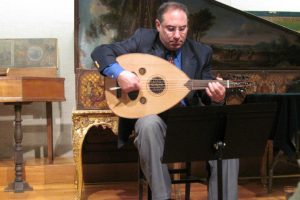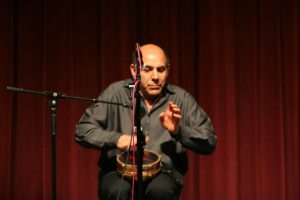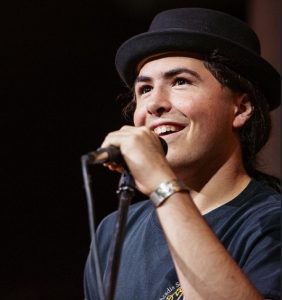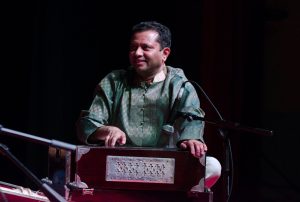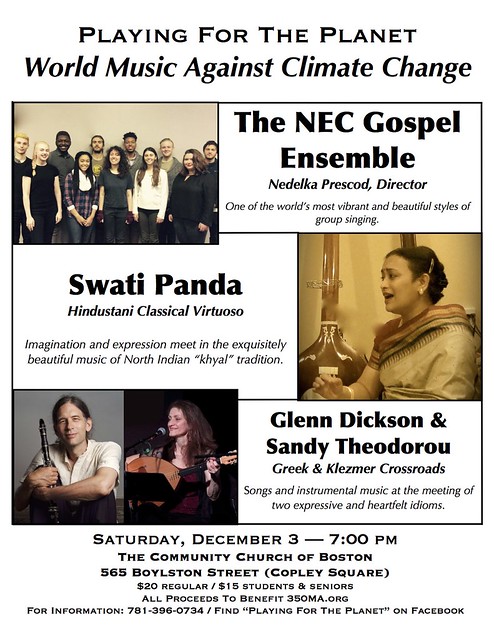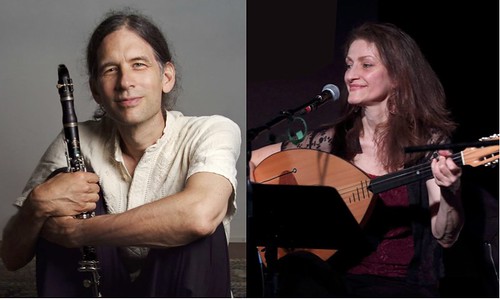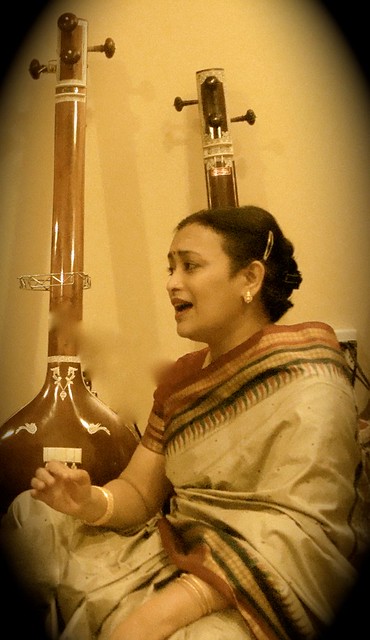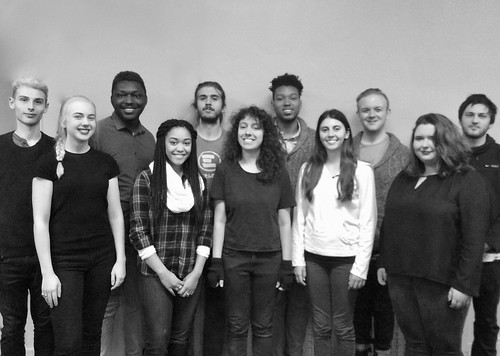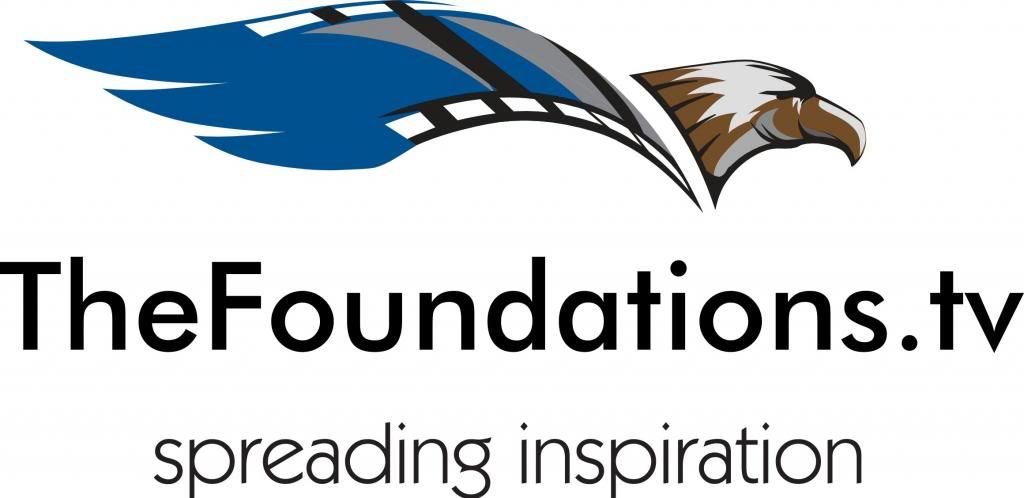India Indian music music Personal vocalists Warren's music
by Warren
leave a comment
Meta
SiteMeter
Brighter Planet
University of Southern Maine, May 5, 2023
Earlier this year I gave my first public concert since before COVID. I had been invited to sing at the Bertha Crosley Ball Center for Compassion at the University of Southern Maine in Portland, and we wound up having a program almost concurrently with their Commencement.
Harmonium accompaniment was provided by Kaavya Valiveti and Rajesh Pai was on tabla. This was a very sympathetic team and I felt quite relaxed.
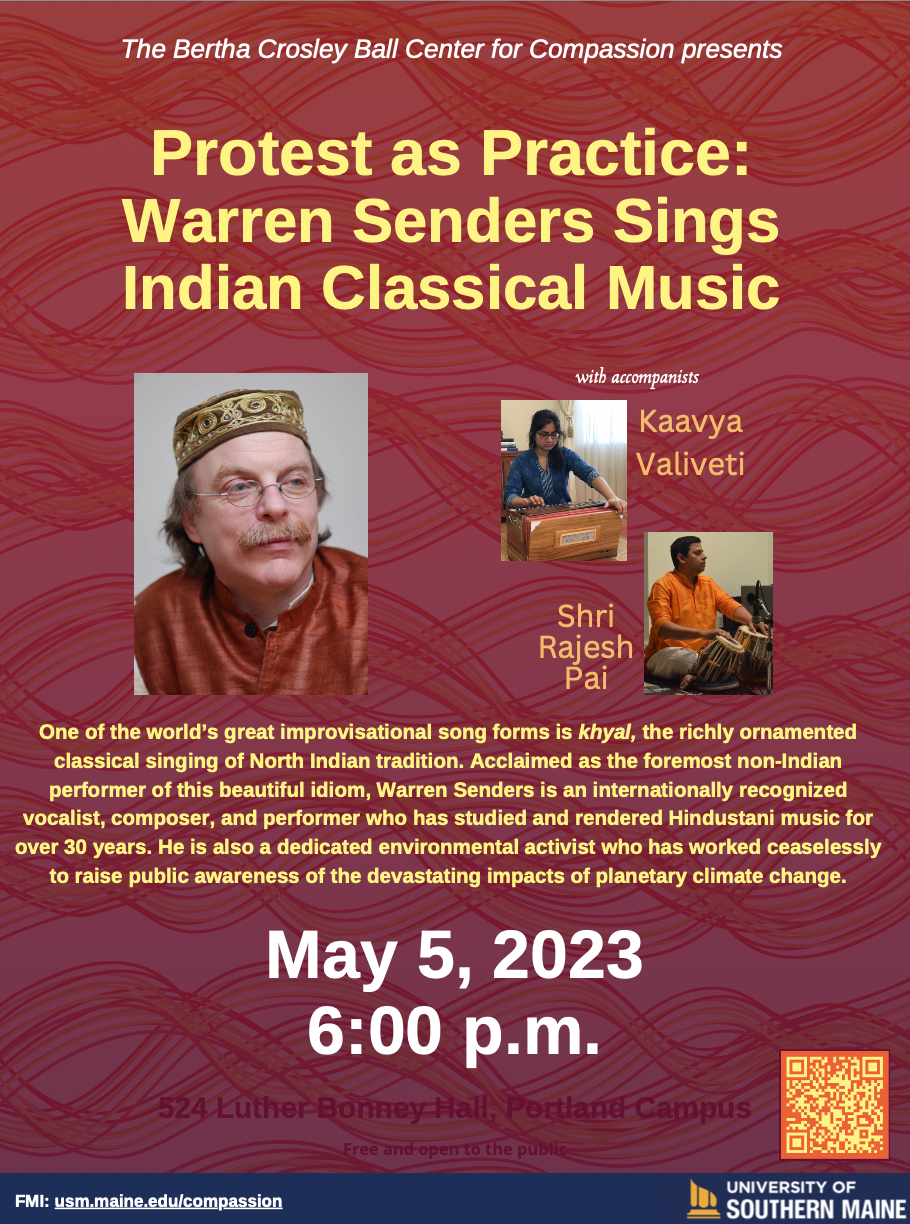
I opened with a full-length Puriya Kalyan. Vilambit: Hovana laagi saanjh / Drut: Jawoon tore charan.
The first half finished with one of my favorite light pieces, the Pahadi geet Jyuda kinjo dolna.
After the interval I started off with a two-parter in Hindol. The medium teentaal bandish Hori khelata hai giridhari is a great vehicle for bol-bant, and Rajesh and I got into some enjoyable rhythmic play. The drut composition Sundara aati chatur naar in ektaal has a very nice lilt.
The penultimate item was a tarana in Khamaj. This is an old traditional Gwalior cheez with some nice pakhawaj bols in the last line of the antara.
And I ended with Jamuna ke teer in Bhairavi.
I really enjoyed this concert. Though the audience was mostly newcomers to the music, they listened with great sympathy and feeling. There were several old friends there, including one person I’d last seen in 1976(!).
If for some reason you want to listen to the entire thing from beginning to end, with the introduction by Vaishali Mamgain and all of my remarks, here it is as a single uninterrupted file.
environment India music Politics: 350.org benefit concert Cape Breton music climate change dumbeq fiddle Indian music Middle-Eastern music oud world music
by Warren
leave a comment
Meta
SiteMeter
Brighter Planet
Playing For The Planet: World Music Against Climate Change — June 2, 2018

Mark your calendars for one of the year’s most exciting musical events!
On Saturday, June 2, the seventeenth “Playing For The Planet” benefit concert showcases master musicians from three different musical traditions, in a benefit for the environmental advocacy group 350MA.org.
Come and hear Mal Barsamian and Charles Dermenjian performing Armenian and Turkish music, Gus LaCasse’s Acadian & Cape Breton fiddling, and a Hindustani performance by vocalist Ramchandra Joshi.
The music begins at 7:00 pm, at The Community Church Of Boston, 565 Boylston Street (Copley Square), Boston.
Admission is $20; $15 students & seniors.
Tickets are available online through eventbrite.
For further information, please call 781-330-8032.
“Playing For The Planet: World Music Against Climate Change” is the seventeenth concert in an ongoing series of cross-cultural events produced by Boston-area musician and environmental activist Warren Senders. These concerts were conceived as a way for creative musicians to contribute to the urgent struggle against global warming. Their choice of beneficiary, 350MA.org, is focused on building global consensus on reduction of atmospheric CO2 levels — action which climatologists agree is necessary to avoid catastrophic outcomes.
Because the climate problem recognizes no national boundaries, the artists represent musical styles from three different parts of the globe, and share key musical values: listening, honesty, creativity, and respect. And, of course, they are all committed to raising awareness of the potentially devastating effects of global warming. It’ll be an incredible evening of powerful music — from some of the finest musicians in New England and the world.
About The Artists
Mal Barsamian and Charles Dermenjian
Mal Barsamian’s musical career began when he was four years old playing the doumbek (hand drum) with his father Leo Barsamian at an Armenian picnic. Mal comes from a family of oud players starting with his grandfather, great-uncle, his uncle and of course his father. He has gone on to become a sought-after oud player (lute) and clarinetist as well as other instruments such as doumbek, guitar, bouzouki, and saxophone in Armenian, Greek, and Middle Eastern communities for forty years throughout the country.
He performed with the late Esber Korporcu, an important figure in Boston’s Middle-Eastern music community, and has also appeared with Mehmet Sanlikol’s Dunya organization. Mal is a specialist in music written by Armenian composers active in Istanbul during the later years of the Ottoman Empire. Also trained as a classical guitarist, he obtained his Bachelor’s and Master’s degrees in classical guitar performance studying with Robert Paul Sullivan from the New England Conservatory of Music.
Mal is on the applied faculty staff at Tufts University’s World Music Department, teaching oud, saxophone, clarinet and percussion, an applied faculty member at Boston College and also leads the Middle Eastern Ensemble at New England Conservatory of Music.
Charles Dermenjian plays percussion, featuring the doumbek, the most commonly played percussive instrument throughout Middle Eastern cultures, and has performed extensively both across the United States and abroad. In addition to playing with numerous Middle Eastern musicians, Charles has performed locally with Stan Strickland, as well as several Berkley College faculty. Aside from performing, Charles has devised and applied specific rhythmic teachings as a form of meditative group therapy.
Gus LaCasse
“…a natural-born fiddle player…whose energy would power a small city.”
— Peter Sutherland, Young Tradition Vermont —
A folk fiddler with both speed and savage energy, Gus La Casse’s repertoire reflects his innovative spirit and dedication to the Cape Breton and Acadian fiddle traditions, playing both standards of the genre and his original material. Based in Downeast Maine, Gus maintains an active performance schedule as a solo artist and with other musicians including guitarist Peter Lindquist, rock-to-world-music band Big Tree and a contra dance trio.
Gus’ music has also taken him beyond Maine. He was the 2014 student in residence at The Acadia School of Traditional Music, appearing on the Canadian international television broadcast from the Congrès Mondial Acadien 2014. He traveled to Ireland as part of the Young Tradition Vermont touring group in 2016, and has enjoyed playing the legendary Club Passim in Cambridge, MA.
Ramchandra Joshi
An accomplished vocalist and harmonium player, Ramchandra Joshi was introduced to the world of music at the age of 8 by his mother Smt Anjani Tilak, a disciple of Pt Manikbua thakursdas. He has trained with Smt. Tulika Ghosh, a disciple of Pt Gyanprakash Ghosh from Kolkata, at Sangeet Mahabharati Music Academy in Mumbai.
Ramchandra Joshi’s Gayaki is inspired by the legendary vocalist from Gwalior Gharana Dr.Veena Sahasrabuddhe, with whom he performed on several occasions, notably the 1994 Malhar Festival at the Nehru Cente.
A specialist in khyal, thumri, natyasangeet, bhavgeet, bhajans and ghazals, he has toured extensively in India, USA, UK and Switzerland. Ramchandra holds B+ Grade from All India Radio.
As a harmonium accompanist Ramchandra has performed alongside many senior and junior artists like Arati Ankalikar-Tikekar, Konkana Banerjee, Sanhita Nandi,Girish Chatterjee, Sandeep Bhattacharya, Rahul Deshpande, Mahesh Kale, and many more. He has lived in the United States since 2003.
On June 2, Ramchandra Joshi will be accompanied by Sri Rajesh Pai on tabla.
About 350.org and 350MA.org
Co-founded by environmentalist and author Bill McKibben, 350.org is the hub of a worldwide network of over two hundred environmental organizations, all with a common target: persuading the world’s countries to unite in an effort to reduce global levels of atmospheric carbon dioxide to 350 parts per million or less. Climatologist Dr. James Hansen says, “If humanity wishes to preserve a planet similar to that on which civilization developed and to which life on Earth is adapted, paleoclimate evidence and ongoing climate change suggest that CO2 will need to be reduced from its current 400 ppm to at most 350 ppm.” (Dr. Hansen headed the NASA Institute for Space Studies in New York City, and is best known for his testimony on climate change to congressional committees in the 1980s that helped raise broad awareness of the global warming issue.) Activists involved in the 350 movement include Rajendra Pachauri (Chairman, Intergovernmental Panel on Climate Change), Vandana Shiva (world-renowned environmental leader and thinker), Archbishop Desmond Tutu (1984 winner of the Nobel Peace Prize and a global activist on issues pertaining to democracy, freedom and human rights), Van Jones, Bianca Jagger, Barbara Kingsolver and many more.
350MA.org is the Massachusetts Chapter of this worldwide advocacy group, and the hub for the Better Future Project.
====================================
The Community Church of Boston is a free community united for the study and practice of universal religion, seeking to apply ethical ideals to individual life and the democratic and cooperative principle to all forms of social and economic life. We invite you to read on to discover more about us, join us one Sunday for a thought-provoking and joyful time, or contact the church to find out more about our community: info@communitychurchofboston.org
====================================
Tickets are available online through eventbrite.
environment India Indian music music vocalists: benefit concert
by Warren
leave a comment
Meta
SiteMeter
Brighter Planet
Playing For The Planet — World Music Against Climate Change, December 3, 2016

On Saturday, December 3, the fourteenth “Playing For The Planet” benefit concert will showcase master musicians from three different musical traditions, with all proceeds going to benefit the environmental advocacy group 350MA.org. The performers include Klezmer and Greek perspectives from Glenn Dickson & Sandy Theodorou, the enthralling Hindustani (North Indian) vocal music of Swati Panda, and the rich vocal blend of the NEC Gospel Ensemble. The music begins at 7:00 pm, at The Community Church Of Boston, 565 Boylston Street (Copley Square), Boston. Admission is $20; $15 students & seniors. For information, please call 781-396-0734, or visit the event website at www.warrensenders.com.
“…Senders possesses a gift
for assembling fascinating programs.”
— Andrew Gilbert, The Boston Globe —
Purchase tickets online from CCNOW:
Regular admission: $20
If you prefer to use PayPal, please use the link below:
“Playing For The Planet: World Music Against Climate Change” is the fourteenth concert in an ongoing series of cross-cultural events produced by Boston-area musician and environmental activist Warren Senders. These concerts were conceived as a way for creative musicians to contribute to the urgent struggle against global warming. Their choice of beneficiary, 350MA.org, is focused on building global consensus on reduction of atmospheric CO2 levels — action which climatologists agree is necessary to avoid catastrophic outcomes.
Because the climate problem recognizes no national boundaries, the artists represent musical styles from three different parts of the globe, and share key musical values: listening, honesty, creativity, and respect. And, of course, they are all committed to raising awareness of the potentially devastating effects of global warming. It’ll be an incredible evening of powerful music — from some of the finest musicians in New England and the world.
“…pleasant surprises and stimulation of the aesthetic synapses…
…an open-ended, floating, world music festival…”
— Steve Elman, ArtsFuse —
ABOUT THE ARTISTS
Glenn Dickson & Sandy Theodorou
Glenn has garnered international attention for his work with Shirim Klezmer Orchestra and Naftule’s Dream, while Sandy is a major force for the revival of traditional music in the Boston area with her band, Revma, and her work with Rebetoparea and Oinos. Mainstays in the traditional klezmer and Greek music scenes in Boston and beyond, Glenn and Sandy will present a set of traditional klezmer and Greek tunes, two extremely expressive folk musics which feature the clarinet and accordion. From the mesmerizing laments of Epirus to the rollicking freylakhs of the Ukrainian Jews, the duo’s musicianship is astonishing, their versatility uncanny.
Sandy (Matoula) Theodorou is a vocalist, accordion, and laouto player who specializes in traditional Greek regional music and Greek urban rebetika. She has performed with master musicians including Beth Bahia Cohen, Manos Koutsaggelides, Malcolm Barsamian, and Grigoris Marinakis. She was nominated for Best Sound Designer by the New Hampshire Theatre Awards for her design and performance of music for the theatrical production “The Burial At Thebes”. She performed with the Boston Lykeion Ellinidon and served as chairperson of their Traditional Greek Music Department. She was born in Pireas, and musically inspired by her family roots in Epiros and Kefalonia.
http://matoulamusic.com
Glenn Dickson has produced 11 recordings with his two bands, the traditional klezmer band Shirim, and the ground breaking original jazz/rock/klezmer band Naftule’s Dream. Naftule’s Dream has played major international jazz festivals in Montreal, Berlin, New York and Chicago and has been closely associated with John Zorn’s Tzadik label. Shirim has collaborated with author/artist Maurice Sendak on “Pincus & the Pig,” performed with the Philadelphia Pops, and contributed music to a Woody Allen soundtrack (Deconstructing Harry). Glenn has also won a Massachusetts Cultural Council Artist Grant award for composition and has performed microtonal jazz (Joe Maneri Sextet), Greek music (Revma), folk-rock (Hypnotic Clambake) and free-jazz (David Haas Group). www.shirim.com, www.naftulesdream.com
Swati Panda
“Good music is that which touches your soul” says Swati Panda, the founder of the Raganjali School of Music. The propagation of Hindustani music in Massachusetts is her mission. A dedicated teacher, Swati Panda strives to inculcate the love for music in her students through clear instruction and intensive training. Raganjali School of Music is a modern day Gurukul, which currently offers Hindustani vocal music classes at Shrewsbury.
Swati Panda holds a Masters’ (Sangeet Alankar) degree in Hindustani (North Indian Classical) vocal music from Sangeet Mandir, Bhubaneswar, Orissa – an affiliate of the Akhil Bharatiya Gandharva Mahavidyalaya Mandal, Pune. Swati’s musical training began with Guru Shri Gopal Ch. Panda. A few years later, she found her musical guide and mentor, Late Dr. Mohan Charan Senapati. It was under his loving and patient guidance that she received her Sangeet Visharad (B.A.) & Sangeet Alankar (M.A.) degrees from the ABGMV, Pune, via Sangeet Mandir (founded in Bhubaneswar by Dr. Senapati, and an affiliate of the Sangeet Mahavidyalaya in Pune). Swati’s style represents a blend of Gwalior & Kirana gharaana gayaki, the result of her Guru’s extensive training under the well known Gwalior Gharana vocalist Pandit Keshav Bua Ingle and the Kirana Gharana legend Pandit Bhimsen Joshi.
Swati’s gayaki is characterized by methodical, yet mellifluous note progression followed by varied and complex taan patterns. Besides Khayals, Swati’s repertoire includes thumri, bhajans and other semi-classical compositions. Swati has been composing, writing and teaching music in the Massachusetts area since 1993.
She will be accompanied by Harshal Tole on tabla and Rajesh Saluja on harmonium.
The NEC Gospel Ensemble
The New England Conservatory’s Gospel Ensemble was formed in the Fall of 2013.
Under the direction of Nedelka F. Prescod, the Ensemble explores “modern” Gospel music from its beginnings in the late 1960s to its current sound and expression. From this expansive, evolving and growing canon of Black Sacred music, NEC’s Gospel Ensemble selects the music of key composers and choir leaders to study, workshop and present with authenticity and sincerity.
The vocalists in the ensemble have opportunities to learn and work with traditional and more current forms of vocal harmony, call and response/hymn lining and solo improvisation as utilized in modern African-American churches. The instrumentalists are offered opportunities to arrange as an independent entity, work with re-harmonizations, build their sensitivity and skill sets for accompanying vocalists, as well as learn the subtleties that establish the genre’s unique sound and feel. All music is taught/learned through oral tradition with a focus on the importance and role of music in African-American social and spiritual settings.
NEDELKA F. PRESCOD is a vocalist, arranger, songwriter, choral director, vocal coach, educator, social activist and mother. She has performed or shared the stage with such living legends as Kenny Garrett, Danilo Perez, Fred Hersch, Jason Moran, Jowee Omicil, Ben Eunson, and with the Omar Thomas Large Ensemble. Her artistry can be heard on recordings with Kenny Garrett, Danilo Perez, Pharoah Sanders, Brian Blade, Mulgrew Miller, Lionel Loueke, AntiPop Consortium, and on her independently released solo recording project, “Manifest” (2008). She has also performed background vocals for Alicia Keys, Jonathan Nelson, Jason Nelson and Dorothy Norwood.
About 350.org and 350MA.org
Co-founded by environmentalist and author Bill McKibben, 350.org is the hub of a worldwide network of over two hundred environmental organizations, all with a common target: persuading the world’s countries to unite in an effort to reduce global levels of atmospheric carbon dioxide to 350 parts per million or less. Climatologist Dr. James Hansen says, “If humanity wishes to preserve a planet similar to that on which civilization developed and to which life on Earth is adapted, paleoclimate evidence and ongoing climate change suggest that CO2 will need to be reduced from its current 400 ppm to at most 350 ppm.” (Dr. Hansen headed the NASA Institute for Space Studies in New York City, and is best known for his testimony on climate change to congressional committees in the 1980s that helped raise broad awareness of the global warming issue.) Activists involved in the 350 movement include Rajendra Pachauri (Chairman, Intergovernmental Panel on Climate Change), Vandana Shiva (world-renowned environmental leader and thinker), Archbishop Desmond Tutu (1984 winner of the Nobel Peace Prize and a global activist on issues pertaining to democracy, freedom and human rights), Van Jones, Bianca Jagger, Barbara Kingsolver and many more.
350MA.org is the Massachusetts Chapter of this worldwide advocacy group, and the hub for the Better Future Project.
The Community Church of Boston is a free community united for the study and practice of universal religion, seeking to apply ethical ideals to individual life and the democratic and cooperative principle to all forms of social and economic life. We invite you to read on to discover more about us, join us one Sunday for a thought-provoking and joyful time, or contact the church to find out more about our community: info@communitychurchofboston.org
Purchase tickets online from CCNOW:
Regular admission: $20
If you prefer to use PayPal, please use the link below:
Order Tickets Online Via EventBrite.
environment India Indian music Jazz music vocalists: benefit concert
by Warren
leave a comment
Meta
SiteMeter
Brighter Planet
Playing For The Planet: World Music Against Climate Change
On Saturday, November 7, the twelfth “Playing For The Planet” benefit concert will showcase master musicians from three different musical traditions in a rare evening of pan-cultural improvisation, with all proceeds going to benefit the environmental advocacy group 350MA.org. The performers include flute master Geni Skendo’s “Astronauts of Albania,” the boundary-bending explorations of the Strings Theory Trio, and the acclaimed Hindustani vocal music of Smt. Shuchita Rao. The music begins at 7:00 pm, at The Community Church Of Boston, 565 Boylston Street (Copley Square), Boston. Admission is $20; $15 students & seniors. For information, please call 781-396-0734, or visit the event website at www.warrensenders.com.
Purchase tickets online from CCNOW:
Regular admission: $20
Student/Senior Admission: $15
Advance orders will be accepted until 3 pm on November 7.
If you prefer to use PayPal, please use the link below:

“Playing For The Planet: World Music Against Climate Change” is the twelfth concert in an ongoing series of cross-cultural events produced by Boston-area musician and environmental activist Warren Senders. These concerts were conceived as a way for creative musicians to contribute to the urgent struggle against global warming. Their choice of beneficiary, 350MA.org, is focused on building global consensus on reduction of atmospheric CO2 levels — action which climatologists agree is necessary to avoid catastrophic outcomes.
“…Senders possesses a gift for assembling fascinating programs.”
— Andrew Gilbert, The Boston Globe —
Because the climate problem recognizes no national boundaries, the artists represent musical styles from three different parts of the globe, and share key musical values: listening, honesty, creativity, and respect. And, of course, they are all committed to raising awareness of the potentially devastating effects of global warming. It’ll be an incredible evening of powerful music — from some of the finest musicians in New England and the world.
“…pleasant surprises…an open-ended, floating, world music festival…”
— Steve Elman, ArtsFuse —
====================================
About The Artists
====================================
The Strings Theory Trio

“Genre-defying…Lively and engaging, a journey you are thrilled to be on.”
Liane Curtis, The Boston Musical Intelligencer
Combining idiomatic flexibility, a deep wellspring of creativity, and world-class virtuosity, violinist Mimi Rabson is one of the Boston area’s most valuable musical resources — and her String Theory Trio is a uniquely compelling synthesis of classical chamber music and directed improvisation, bringing together some of Rabson’s most important influences and inspirations. With Rabson and Helen Sherrah-Davies on five string violins and Junko Fujiwara on cello, the String Theory Trio supercharges the intimate atmosphere of chamber music with a triple dose of edgy, daring improvisation. The listener is treated to experiencing Western classical tradition anew; the surging counterpoint and crystalline instrumental sonorities gain new resilience and allure from their origin in the inspiration of the moment. Simultaneously delicate and dangerous, the Strings Theory Trio’s music is richly nuanced and deeply satisfying.
“Mimi Rabson and Strings Theory Trio have succeeded wonderfully at what many try to do: creating improvised music that sounds, flows and moves as if it’s been composed, yet has the expressiveness, spirit and freedom of improvised music.” Darrell Katz, Director, Jazz Composers Alliance
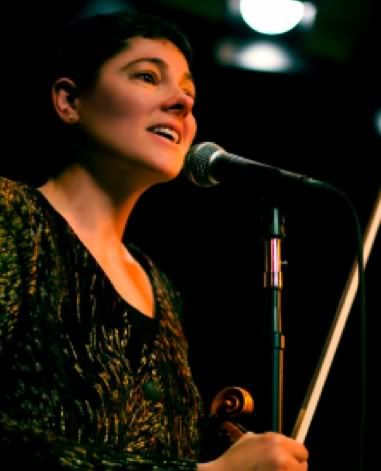
Mimi Rabson has played in more different contexts, styles and venues than most performers can even imagine. She has appeared on “The Late Show with David Letterman,” performed with Itzhak Perlman on the recording “In the Fiddler’s House,” and was featured in “A Jumpin’ Night in the Garden of Eden,” a documentary film about Klezmer music. Her composition “Klezzified” was featured on Saturday Night Live. RESQ (aka Really Eclectic String Quartet), founded by Rabson, performs her original compositions in addition to her arrangements of jazz, funk, fusion, gospel, and Latin music. A founding member of the Klezmer Conservatory Band, Rabson worked with that organization for many years, touring as well as recording, composing, and acting as their musical director. Rabson is currently an Associate Professor at Berklee College of Music.
Junko Fujiwara is both a creative musician/improviser and an active classical player performing in varying venues throughout the East Coast and the Midwest. Her current performing groups include: BOLT: Adventurous Improvised Music, the Mimi Rabson Trio, the Eric Hofbauer Quintet, Evocation Trio, and the Di Evano Project. Fujiwara is also a member of the Kalliope Piano Trio and a semi-regular performer with the Metal & Glass Ensemble. A member of the cello faculty at Boston College, she is an active teacher in many school systems and also maintains a studio of private students. Fujiwara holds degrees in music from Northwestern University and Lawrence University in Appleton, Wisconsin.
Helen Sherrah-Davies, a native of Britain, is a graduate of both Berklee College of Music and the New England Conservatory. International credits include recording with Herbie Flowers (Sky/T Rex) in the UK, performing with Jon Lord (Deep Purple) in Switzerland, at the wedding of “Posh Spice” to David Beckham in Ireland, Montepulciano Opera Festival Orchestra in Italy, and recently at an International Music Festival in the West Bank, Palestine, also teaching at Al Kamandjati in Ramallah. Stateside credits include performing with Simon Shaheen, with the Arabic Fusion ensemble, ZilZala, Mimi Rabson’s Power Trio Project, singer song-writer Alan Williams’, “Birdsong at Morning” and the J Way Jazz String Quartet. Summer 2012 saw her explore microtonal notes between “the notes” with monster guitarist Dave “Fuze” Fiuczynski’s unique “Planet Microjam Institute” at the Jazz Festival in Genoa, Italy. Sherrah-Davies is currently on the faculty of Berklee College of Music.
====================================
Shuchita Rao
“Khayal renditon by Shuchita Rao mesmerizes audience at Essence of India Festival 2012”
Lokvani
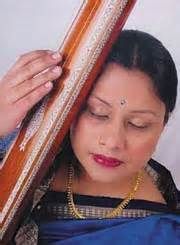
Shuchita Rao was born in a family of music lovers in Hyderabad, India. Her initial training in Hindustani Vocal Classical music was with Dr. N.K.Karhade. Later, she trained under the noted Gwalior Gharana exponent Smt. Malini Rajurkar. She has also received guidance from Padma Bhushan Dr. Prabha Atre, Padmashri Shri Ramakant Gundecha, Pandit Ajay Pohankar and Pandit Vinayak Torvi.
Shuchita is proficient in Hindustani classical music as well as Hindustani semi classical music (Thumri, Dadra, Ghazals). She began performing at a very young age and was regularly featured on All India Radio, Hyderabad. She has won several honors and awards for her singing.

Shuchita has given public performances and lecture demonstrations at the following venues:
• MITHAS(MIT) and Harvard University, Cambridge, Mass
• LearnQuest Conference,Weston, Mass
• Tsai Performance Center, Boston, Mass
• Bhai Mardana Singh Institute, Long Beach, CA
• University of Colorado at Boulder, Colorado
• University of Pittsburgh, PA & Shri Venkateshwara temple, Pittsburgh, PA
• Central University, Hyderabad, India
• Maharashtra Mandal, Hyderabad, India
Shuchita freelances on the subjects of Indian Music, Dance and Culture and has written for Indian newspapers/magazines such as Sruti magazine, Times of India, TheHansIndia and Indian Express. In the U.S, she has written for Lokvani, Khabar Magazine and is the arts correspondent for the newspaper India New England.
On November 7, Shuchita Rao will be accompanied by Sri Rajesh Pai on the tabla, and Sri Christopher Pereji on harmonium.
====================================
Geni Skendo
and The Astronauts of Albania
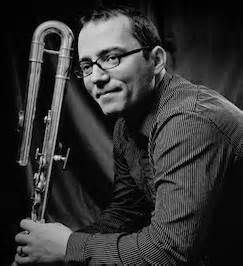
The Boston Globe calls Geni Skendo a “virtuoso,” who creates a unique blend of jazz, free jazz and world music. Geni leads the Albanian/Jazz/Ambience group “Astronauts of Albania” and the free improvised chamber music group, Samurai Jazz Trio, consisting of shakuhachi, bass/shamisen and piano. After a successful performing career in his native Albania, Geni moved to the US in 2003 to raise his jazz playing to a higher level. Studies at the Berklee College of Music and The New England Conservatory (MM) led to a deep, ongoing involvement with the Boston music scene. Geni performs with Mr. Ho’s Orchestrotica (Best World Music Act, Boston Phoenix Readers’ Poll, 2012), in both its quartet and big-band incarnations. The quartet utilizes Geni’s full palette, while the big band relies heavily on Geni’s powerful bass flute in its recreation of long-lost arrangements by the legendary Mexican arranger Juan Garcia Esquivel. Geni’s most recent CD is “Acoustic Cowboy,” featuring original compositions and new arrangements of songs from Olivier Messiaen, African pygmies and the Balkans.

Astronauts of Albania performs Albanian folk music arranged for Shakuhachi & Bass Flute, Oud, Guitar, Bass and Drums. The band’s music seamlessly integrates complex Balkan grooves with free improvised sections, punctuating hypnotic textures with dazzling solo sections.
=============================================
About www.350.org and the number 350:
Co-founded by environmentalist and author Bill McKibben, 350.org is the hub of a worldwide network of over two hundred environmental organizations, all with a common target: persuading the world’s countries to unite in an effort to reduce global levels of atmospheric carbon dioxide to 350 parts per million or less. Climatologist Dr. James Hansen says, “If humanity wishes to preserve a planet similar to that on which civilization developed and to which life on Earth is adapted, paleoclimate evidence and ongoing climate change suggest that CO2 will need to be reduced from its current 385 ppm to at most 350 ppm.” (Dr. Hansen heads the NASA Institute for Space Studies in New York City, and is best known for his testimony on climate change to congressional committees in the 1980s that helped raise broad awareness of the global warming issue.) Activists involved in the 350 movement include Rajendra Pachauri (Chairman, Intergovernmental Panel on Climate Change), Vandana Shiva (world-renowned environmental leader and thinker), Archbishop Desmond Tutu (1984 winner of the Nobel Peace Prize and a global activist on issues pertaining to democracy, freedom and human rights), Van Jones, Bianca Jagger, Dr. James Hansen, Barbara Kingsolver and many more.
350MA.org is the Massachusetts Chapter of this worldwide advocacy group, and the hub for the Better Future Project.
=============================================
The Community Church of Boston is a free community united for the study and practice of universal religion, seeking to apply ethical ideals to individual life and the democratic and cooperative principle to all forms of social and economic life. We invite you to read on to discover more about us, join us one Sunday for a thought-provoking and joyful time, or contact the church to find out more about our community: info@communitychurchofboston.org.
=============================================
Warren Senders is the contact person for “World Music Against Climate Change.” He is one of thousands of concerned global citizens hoping to trigger positive change through social action and the arts. He can be reached at warvij@verizon.net or by telephone at 781-396-0734.
India Indian music music: 78s
by Warren
leave a comment
Meta
SiteMeter
Brighter Planet
humor India Indian music music Personal vocalists: dagarel doggerel
by Warren
leave a comment
Meta
SiteMeter
Brighter Planet
Comic Verse About Indian Music, part 2
“Oral Tradition: Some Hidden Aspects — or, The Ustad’s Advice.”
When I was in my early days,
I fell in love with raags,
Though my mother said the singers
Sounded more like frogs.I learned to sing the alap,
I learned to sing the cheez,
My taan became proficient,
But still it failed to please.I asked an ancient ustad,
how to make a lovely note.
“My son,” he said, “it just requires
a clearing of the throat.”“You start down in the glottis,
and gargle up some phlegm,
then bring it through your larynx
for a truly great ACC-HEM!”“My son,” he then continued,
“Your music won’t be great, ’till
You can make a wad of mucus,
Stained red from years of betel.”I listened to the records
Of the pandits and ustads;
’twas true, I found: the greatest singers
Made the biggest wads.When Bade Ghulam Ali Khan
Throws all his weight around,
His taans, alaps, and gamaks
Produce a stirring sound.But he’s got something else, my friends,
Which modern singers lack:
A wonderfully resonating way
of going “Aaaaaaak!”I heard the maestro Faiyaaz Khan,
who sang in days of yore:
He’d scrape his learned larynx,
and bring up more…and more.Paluskar’s hack was beautiful,
And likewise Amir Khan…
But now this great tradition,
it seems cannot go on.The modern crowd of singers
Will stay forever small,
For though they may sing sweetly,
They cannot cough at all.
humor India Indian music music Personal: dagarel doggerel
by Warren
2 comments
Meta
SiteMeter
Brighter Planet
An Obscure Genre: Comic Verse About Indian Classical Music, part 1.
“Intonational Variation in Oral Tradition — or, Tutti Shruti”
In bygone days in India, the emperor Akbar
Had in his court a singer who was known both near and far.He had a wondrous repertoire, there was no doubt of that —
But every note in every raga came out slightly flat.Because his voice was out of tune, they called him Besur Khan,
He founded a tradition, so his gayaki lives on.For he had some disciples, and they disciples too —
And all of them sing ragas in a loud, discordant moo.And if you ask them nowadays, “why do you sing so flat?”
They’ll say, “it’s our gharana.”
That’s all there is to that.
India Indian music music Personal vocalists Warren's music: fundraising khyal
by Warren
4 comments
Meta
SiteMeter
Brighter Planet
Making It Happen!
The Beauty of Khyal — A Recital of Night Ragas
I’m as happy with this recording as I’ve ever been. The recording session we did on August 16 of this year was wonderfully productive, and this CD represents the first installment of the raga performances Milind Pote, Chaitanya Kunte, and I laid down that night.
Please pitch in. You’ll love this music.
India Indian music music Personal vocalists Warren's music
by Warren
leave a comment
Meta
SiteMeter
Brighter Planet
Bandra Concert, August 21, 2013
The music this evening was just gorgeous. Mukta Raste’s beautiful theka was inspiring and supportive, and Ravindra Lomate played excellent sangat on harmonium. The Bandra Base is a once-in-a-lifetime room: small, sympathetic, filled with excellent resonance and history. Dee Wood, proprietor of the Base, made the farmaish for Malkauns. I’m glad he did; this performance came out with lots of bhaav.
Mora bolere – vilambit teentaal
Banwari mori manata nahin – drut teentaal
Tarana – drut teentaal
Warren Senders – voice
Mukta Raste – tabla
Ravindra Lomate – harmonium
August 21, 2013
The Bandra Base, Bandra, Mumbai, India
Peer na jaanire – vilambit ektaal
Man man ab to man – drut ektaal
tarana – drut teentaal
Warren Senders – voice
Mukta Raste – tabla
Ravindra Lomate – harmonium
August 21, 2013
The Bandra Base, Bandra, Mumbai, India
India Indian music music Personal Warren's music
by Warren
leave a comment
Meta
SiteMeter
Brighter Planet
Interstices – String Quartet (composed 1984, performed 1993)
“Interstices” had its origin in a chart I wrote for the first incarnation of Antigravity, which included all the basic ingredients: a seven-beat vamp, a twisted melody in a Phrygian Maj7 scale, and the superimposition of 6-beat groups on the 7-beat structure to create a 42-beat cross-rhythm. But I feel that the full realization of these ideas was only made possible by the quartet format.
I composed the string quartet score of “Interstices” in 1984 on a visit to New Paltz, NY. The project was originally undertaken as a project for Mimi Rabson’s R.E.S.Q. (Really Eclectic String Quartet), which played it in a recording session before I left for India the first time in 1985.
The version for RESQ was through-composed for their unusual orchestration of 3 violins and bass. Their version sounded great and was the only recorded rendition for many years. In 1990 I assembled a “New Ensemble Music” concert and prepared the piece for performance by 2 violins, viola, and bass — but the woman who was to play 2nd violin disappeared 10 days before the concert and never returned, and it wound up being performed as a trio.
In 1993 I put together another “New Ensemble Music” concert, and this time I got lucky. John Styklunas was playing bass, and he brought his colleague Steve Garrett in on ‘cello; I rewrote the viola part for ‘cello, and I think it sounds great that way. Teresa Marrin and Tomoko Iwamoto did a great job on both violins. There is no distinction between first and second fiddles in terms of the complexity or ranking of the parts.

